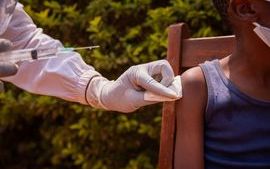- Published:
- 16 October 2025
- Author:
- David Bick
- Read time:
- 6 Mins
For many years, the mainstays of neonatal screening have comprised the neonatal blood spot test, which screens for just 9 conditions, along with neonatal hearing testing and the physical examination. The Generation Study, run by Genomics England in partnership with the NHS in England, will evaluate genome sequencing to screen newborn babies for more than 200 treatable rare conditions. Universal genome sequencing at birth, if implemented, would represent one of the biggest shifts within healthcare for decades.
The Generation Study is using short-read whole genome sequencing of 100,000 neonates to help understand how early diagnosis of treatable rare genetic conditions might improve health outcomes. To take part, parents sign up during pregnancy and a sample – typically from the umbilical cord – is collected shortly after birth. If a condition is suspected, this is returned via NHS specialists for confirmatory testing and ongoing care.
Since launching last year, we’ve been encouraged by the feedback we’ve had from families who have joined, where results are making an impact. It’s an invaluable reminder that there’s a family behind every data point.
We were also pleased to see the Government’s recent 10 Year Health Plan for England references its support for the Generation Study to inform longer-term ambitions of genomic sequencing at birth.
For those who are unaware of what the study is looking to do, it has 3 main aims.
Identifying treatable rare conditions in babies earlier
The Generation Study will evaluate the utility and feasibility of using genome sequencing to screen newborn babies for more than 200 treatable rare conditions. These conditions usually appear in the first few years of life, can be improved if caught early and can be treated in the NHS. This aims to improve the babies' health outcomes and quality of life through more timely diagnoses, as well as early access to care and treatment.
Enabling discovery research
With parental consent, babies’ genomes and health data will be accessed for wider research about genes and health, so we can investigate new testing and treatment for genetic conditions in the future. Approved researchers can access this data in a secure database called the National Genomic Research Library, without knowing the babies’ identities.
Exploring the risks and benefits of storing an individual’s genome over their lifetime
We will continue to engage with the public, parents, healthcare professionals, researchers, rare conditions communities and policymakers to look at the possible benefits, risks and ethical and practical implications of storing an individual’s genome over their lifetime.
Clinical scientists have been central to the study from the outset, helping to shape its principles and design long before any samples were taken. Now that the study is up and running, their involvement has only grown. They’re incredibly important to the study’s success, by analysing the genomic data and supporting the interpretation of results. The combination of skillsets, insights and decades of experience is a must for the study to run optimally.
Today, more than 20,000 participants have joined the Generation Study and we have returned over 13,000 results back to the NHS and families. The study is live in 42 hospitals across the country, with more continuing to come on board. We’re pleased with the progress being made on this front, a big part of which is down to the enthusiasm of the trusts and all the staff involved across so many different specialties.
Other studies exploring genome sequencing in newborns are running in other countries (www.iconseq.org), but the Generation Study is unique in several ways – most notably in how it has been embedded within a national public-funded health system.
It also differs from the current diagnostic approach for rare conditions in this country, which looks for any variants that might be connected to the child’s phenotype and requires further review by clinicians and clinical scientists in NHS Genomic Laboratory Hubs. Our study is only looking for a defined list of genes and variants. In cases where potentially reportable variants are identified, clinical scientists review the variants and determine whether they should be reported. Based on this analysis, 2 types of results are generated: a ‘no condition suspected’ result, which is communicated to participants by Genomics England, and a ‘condition suspected’ result, which is passed to participants through NHS care providers. A ‘condition suspected’ result triggers a process to confirm the result. This allows very early –and, in some cases, lifesaving – treatment for the infant. Examples of conditions where treatment can be lifesaving include severe combined immunodeficiency, spinal muscular atrophy and agammaglobulinaemia.
A key reason for conducting our research study this way and leaning on a mostly automatic process of analysis and interpretation is that we are always conscious of having a process that not only delivers results quickly for families but also keeps clinical scientists’ input focused on where it’s most needed. We know the analysis we are doing requires careful attention and consideration. We also know of the resource constraints among scientists and, above all, that the study must not have any impact on the routine clinical care within NHS hospitals.
The expert analysis conducted by scientists is critical to keeping the number of false positives low and helping to build confidence in the study. We know that, without public trust and confidence, we cannot hope to build the data and evidence that could potentially change how we screen for rare genetic conditions at birth. If policymakers decided to enact this and make genome sequencing at birth universal, as is their ambition, it would represent one of the biggest shifts within healthcare for decades. Genomic sequencing at birth could help families for generations to come through earlier diagnoses and access to treatments, which would make a big difference in how children grow up.
There is still a long way to go before the study’s completion. A key focus is continuing to onboard new hospitals and supporting those already taking part so we can continue boosting the rate of recruitment and hit our target of sequencing the 100,000 genomes and getting those results back to parents. But that’s not our only focus.
Building out the National Genomic Research Library with the consented and de-identified data of Generation Study participants will support broader research into rare conditions and strengthen what is already a world-class genomic resource for approved researchers. We also want to keep up the momentum we’ve built in engaging with parents, scientists and the public, among other groups, to explore their views and expectations – not only about how the study should work but also the use of a genome over the life course to guide and inform care.
It's undoubtedly an exciting time within genomics. As the technology and our understanding of the genome grows, so do the opportunities to shape better health and improve outcomes – which, as we’re always keen to point out, must be evidence-based and supported by robust data.
The Generation Study team would like to thank all clinical scientists for their ongoing work on the study. It is only with their help and expertise that the study is making the difference it is for families around the country. If you have any questions, please contact the Genomics England Generation Study team at [email protected].
Read next
Advances in malaria prevention
16 October 2025
Preventing further deaths from fatal anaphylaxis
16 October 2025




